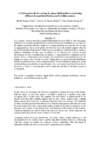Identificador persistente para citar o vincular este elemento:
https://accedacris.ulpgc.es/jspui/handle/10553/12960
| Campo DC | Valor | idioma |
|---|---|---|
| dc.contributor.author | Suárez-Vega, Rafael | en_US |
| dc.contributor.author | Santos-Peñate, Dolores R. | en_US |
| dc.contributor.author | Dorta-González, Pablo | en_US |
| dc.date.accessioned | 2015-03-16T13:39:42Z | |
| dc.date.accessioned | 2018-02-21T14:33:03Z | - |
| dc.date.available | 2015-03-16T13:39:42Z | |
| dc.date.available | 2018-02-21T14:33:03Z | - |
| dc.date.issued | 2010 | en_US |
| dc.identifier.uri | https://accedacris.ulpgc.es/handle/10553/12960 | - |
| dc.description.abstract | In this paper, we have used Geographical Information Systems (GIS) to solve the planar Huff problem considering different demand distributions and forbidden regions. Most of the papers connected with the competitive location problems consider that the demand is aggregated in a finite set of points. In other few cases, the models suppose that the demand is distributed along the feasible region according to a functional form, mainly a uniform distribution. In this case, in addition to the discrete and uniform demand distributions we have considered that the demand is represented by a population surface model, that is, a raster map where each pixel has associated a value corresponding to the population living in the area that it covers. Taking into account the demand distribution and the location and size of the existing facilities, we have obtained a raster map where each pixel has associated the estimated capture for a new competing firm if it decides to locate on it. Finally, a real example is solved where the solution for the three scenarios is compared. | en_US |
| dc.language | eng | en_US |
| dc.source | 9th International Conference on Operations Research (ICOR2010) La Habana | en_US |
| dc.subject | 530999 Otras (especificar) | en_US |
| dc.subject | 5309 Organización industrial y políticas gubernamentales | en_US |
| dc.subject.other | Competitive location | en_US |
| dc.subject.other | Planar Huff problem | en_US |
| dc.subject.other | Demand distribution | en_US |
| dc.subject.other | Surface model of population | en_US |
| dc.subject.other | Forbidden region | en_US |
| dc.subject.other | GIS | en_US |
| dc.title | A GIS based model for solving the planar Huff problem considering different demand distributions and forbidden regions | en_US |
| dc.type | info:eu-repo/semantics/conferenceObject | en_US |
| dc.type | ConferenceObject | en_US |
| dc.identifier.absysnet | 708843 | - |
| dc.identifier.crisid | 2808;1432;2665 | |
| dc.investigacion | Ciencias Sociales y Jurídicas | en_US |
| dc.rights.accessrights | info:eu-repo/semantics/openAccess | es |
| dc.type2 | Actas de congresos | en_US |
| dc.utils.revision | Sí | en_US |
| dc.identifier.supplement | 2808;1432;2665 | - |
| dc.identifier.ulpgc | Sí | en_US |
| item.fulltext | Con texto completo | - |
| item.grantfulltext | open | - |
| crisitem.author.dept | GIR TIDES- Técnicas estadísticas bayesianas y de decisión en la economía y empresa | - |
| crisitem.author.dept | IU de Turismo y Desarrollo Económico Sostenible | - |
| crisitem.author.dept | Departamento de Métodos Cuantitativos en Economía y Gestión | - |
| crisitem.author.dept | GIR TIDES- Técnicas estadísticas bayesianas y de decisión en la economía y empresa | - |
| crisitem.author.dept | IU de Turismo y Desarrollo Económico Sostenible | - |
| crisitem.author.dept | Departamento de Métodos Cuantitativos en Economía y Gestión | - |
| crisitem.author.dept | GIR TIDES- Técnicas estadísticas bayesianas y de decisión en la economía y empresa | - |
| crisitem.author.dept | IU de Turismo y Desarrollo Económico Sostenible | - |
| crisitem.author.dept | Departamento de Métodos Cuantitativos en Economía y Gestión | - |
| crisitem.author.orcid | 0000-0002-1926-3121 | - |
| crisitem.author.orcid | 0000-0002-2694-7943 | - |
| crisitem.author.orcid | 0000-0003-0494-2903 | - |
| crisitem.author.parentorg | IU de Turismo y Desarrollo Económico Sostenible | - |
| crisitem.author.parentorg | IU de Turismo y Desarrollo Económico Sostenible | - |
| crisitem.author.parentorg | IU de Turismo y Desarrollo Económico Sostenible | - |
| crisitem.author.fullName | Suárez Vega, Rafael Ricardo | - |
| crisitem.author.fullName | Santos Peñate, Dolores Rosa | - |
| crisitem.author.fullName | Dorta González, Pablo | - |
| Colección: | Actas de congresos | |
Visitas
362
actualizado el 16-ene-2026
Descargas
102
actualizado el 16-ene-2026
Google ScholarTM
Verifica
Comparte
Exporta metadatos
Este elemento está sujeto a una licencia Licencia Creative Commons

